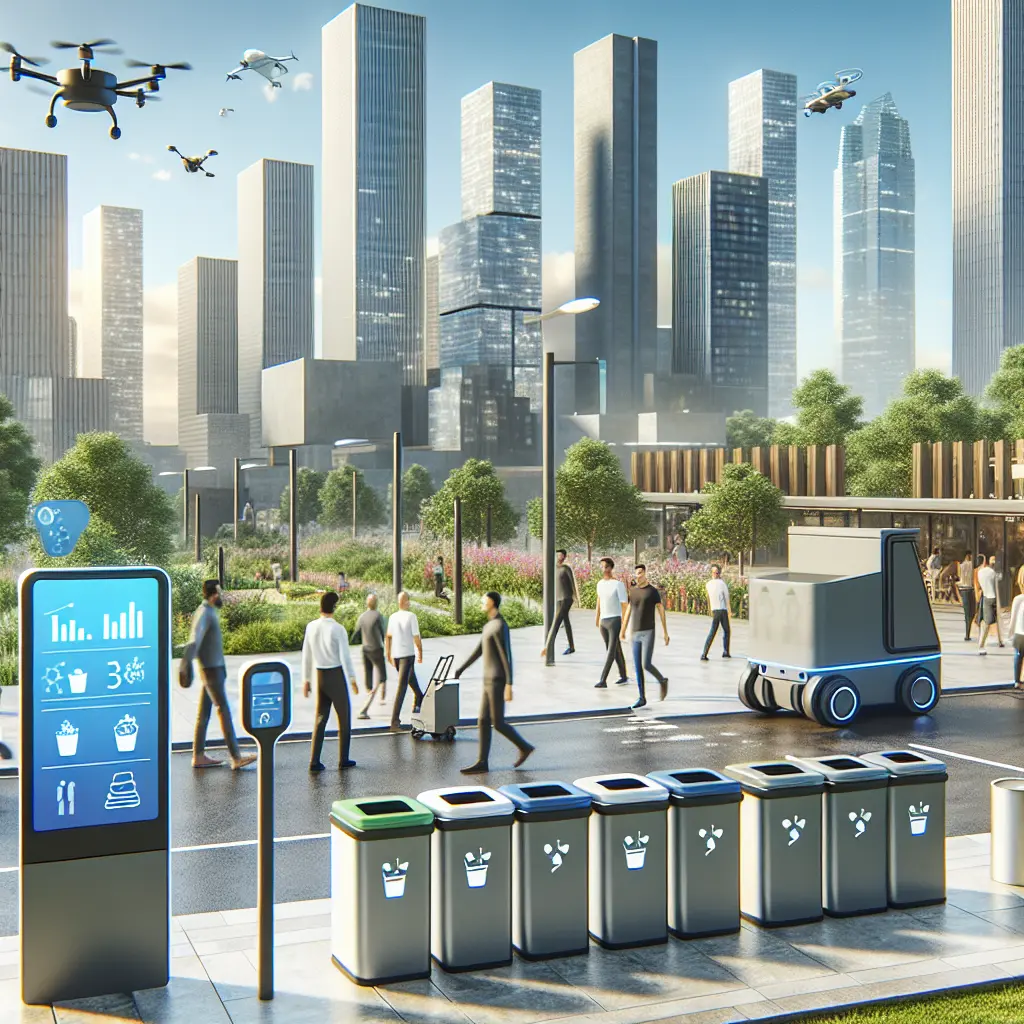
The Future of Urban Waste: Smart Waste Management Systems
In the fast-paced world of urban development, smart waste management systems are leading the charge towards cleaner, more sustainable cities. As urban populations grow rapidly, cities worldwide are turning to innovative technologies to tackle escalating waste challenges. By integrating advanced waste management technology with the Internet of Things (IoT), traditional methods are transformed into sophisticated smart city waste systems.
The Rise of Smart Waste Management
Smart waste management systems have emerged in response to pressing urban waste issues. These systems utilize smart bins equipped with sensors to monitor waste levels in real-time, facilitating efficient waste collection. This optimization reduces unnecessary trips, conserving fuel and minimizing carbon emissions, thereby significantly contributing to urban sustainability.
For instance, cities like Barcelona have implemented smart bins that communicate with central systems, alerting waste collectors when bins are full. This system has led to a 30% reduction in operational costs and decreased traffic congestion caused by garbage trucks, showcasing its potential source.
IoT Waste Management: Transforming Urban Landscapes
IoT waste management technologies offer a transformative approach to waste disposal. By integrating IoT devices, cities can develop urban recycling solutions that enhance efficiency and reduce landfill reliance. These systems provide valuable data that can be used to improve recycling rates and develop sustainable waste management strategies.
A notable example is the city of Seoul, which has adopted a pay-as-you-throw model supported by IoT technology. This model encourages residents to sort and recycle waste more effectively, leading to significant urban waste reduction source.
Smart Waste Disposal: Innovation in Action
Innovative smart waste disposal practices are reshaping urban landscapes. These include pneumatic waste collection systems that transport waste through underground tubes, reducing surface-level pollution and noise. Such systems have been successfully deployed in Stockholm, drastically improving the city's cleanliness and sustainability source.
Moreover, smart bins are evolving beyond simple waste level monitoring. Modern iterations are equipped with AI technology that can sort recyclables from non-recyclables, enhancing urban recycling solutions and promoting sustainable waste management practices.
Case Studies and Success Stories
Barcelona: Leading the Charge with Smart Bins
Barcelona's smart city initiatives highlight the potential of smart bins in urban environments. The city's waste management system employs over 1,500 smart bins, each equipped with sensors that transmit data to a central hub. This setup has optimized waste collection routes, saving both time and resources while significantly reducing carbon emissions source.
Seoul: Innovative IoT Waste Management
Seoul's adoption of IoT waste management technology demonstrates its commitment to sustainability. The city's pay-as-you-throw program leverages IoT devices to monitor individual household waste generation, incentivizing citizens to reduce and sort their waste efficiently. This initiative has resulted in a 24% reduction in landfill waste source.
Challenges and Opportunities
While the benefits of smart waste management are clear, cities face challenges in implementing these technologies. Initial setup costs, data privacy concerns, and the need for public acceptance are significant hurdles. However, the long-term savings and environmental benefits often outweigh these initial challenges.
The integration of IoT and AI in waste management technology also opens opportunities for further innovation. As these technologies advance, cities can expect even more sophisticated systems capable of addressing complex urban waste issues with increased precision.
The Path Forward: Embracing Waste Management Innovation
As urban populations continue to grow, the demand for efficient urban waste solutions becomes more pressing. Embracing waste management innovation is crucial for cities aiming to enhance their eco-friendly practices and promote urban sustainability.
Recent global events underscore the importance of such efforts. For example, the Øya Festival 2024's commitment to sustainability highlights a growing trend toward environmentally conscious initiatives source. Similarly, the return of five students from Cuba as doctors illustrates a broader understanding of sustainable practices across various sectors source.
Cities must continue exploring smart city waste systems and investing in technologies that foster environmental stewardship. By doing so, they will lay the groundwork for a cleaner, more sustainable urban future—one where smart waste management plays a pivotal role in enhancing the quality of life for all residents.
Conclusion: Embracing the Future of Waste Management
In conclusion, smart waste management systems offer an effective solution to the challenges posed by urbanization and environmental concerns. Through innovative waste disposal practices and the strategic use of IoT technology, cities can achieve significant improvements in sustainability and efficiency. As we look towards the future, embracing these advancements will be essential for building cities that are not only technologically advanced but also environmentally conscious.
The integration of AI and IoT in waste management doesn't just streamline operations; it fosters a culture of sustainability by encouraging recycling and reducing carbon footprints. While challenges such as setup costs and public acceptance exist, the long-term environmental benefits far outweigh these hurdles.
As we journey towards a cleaner future, it's essential to keep exploring innovative urban solutions that prioritize sustainability. The potential of smart waste management to enhance quality of life is immense, urging us to embrace these advancements actively.
To further engage with this pivotal topic, I encourage you to share your thoughts or experiences regarding smart waste management in your city. How do you perceive the role of technology in creating sustainable urban environments? Your insights could inspire others to contribute to this global effort.
Let's continue this conversation and explore how we can make our cities not only smarter but also greener. For more in-depth perspectives on sustainable innovations worldwide, explore resources like National Geographic or World Economic Forum.
Thank you for being a part of this journey towards sustainability.
Author: Walter Jennings